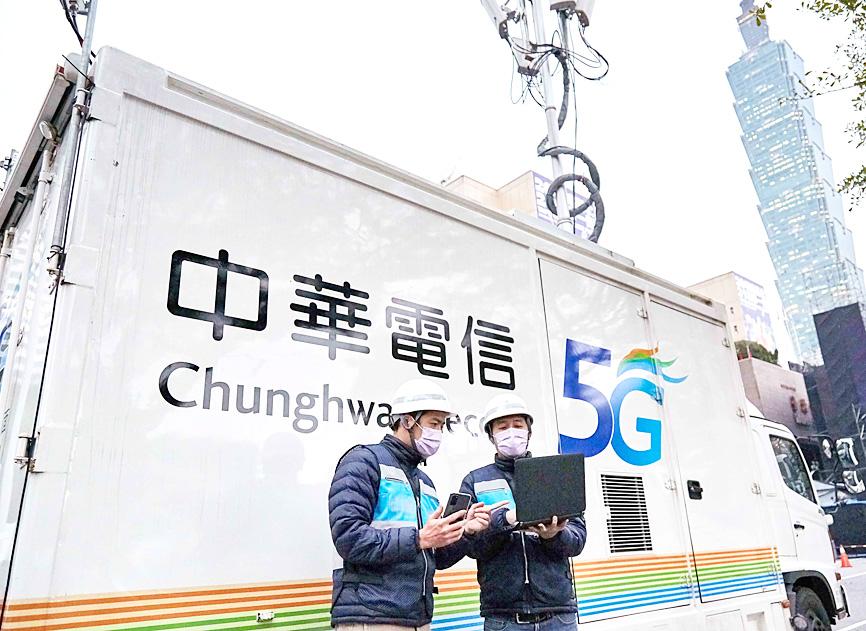Chunghwa Telecom Co (中華電信) has signed an agreement to participate in a multilateral project to lay an undersea cable connecting several countries in Asia in a bid to increase its international presence, the company announced yesterday.
The 12,000km-long Apricot subsea cable system that is to feature state-of-the-art transmission technology would connect Taiwan, Japan, Singapore, Indonesia, the Philippines and Guam, the company said.
Scheduled to be launched in 2024, the Apricot cable system would have a capacity of more than 190 terabits per second to meet growing demand for access to 5G mobile broadband networks, the Internet of Things, artificial intelligence, virtual reality, cloud services and videoconferencing.

Photo courtesy of Chunghwa Telecom Co
The high-capacity undersea cable would bring high-speed, reliable Internet to Taiwan as it enters the 5G era, and is expected to lay the cornerstone for advancing Chunghwa Telecom’s cross-border telecom cooperation in the Asia-Pacific region and enhance Taiwan’s status in the region.
To improve Taiwan’s global Internet security, Chunghwa Telecom has been bolstering its links with neighboring countries and important telecom markets in the region by participating in several international undersea cable projects.
It has invested in the construction of the Asia-Pacific Gateway (APG) and the New Cross Pacific submarine cable networks, which are both landed at Yilan County’s Toucheng Township (頭城).
It is also participating in the construction of the Southeast Asia-Japan 2 (SJC2) undersea cable from New Taipei City’s Tamsui District (淡水) and Pingtung County’s Fangshan Township (枋山) to enhance Taiwan’s national network security. The SJC2 cable is expected to be completed next year.
The Apricot cable features a new router that could link with the APG and SJC2 cables through routers in Hong Kong, Vietnam and Thailand, and form a more comprehensive international undersea network in Southeast Asia, said Wu Hsueh-lan (吳學蘭), president of Chunghwa Telecom’s international business group.
Alphabet Inc’s Google and Facebook Inc yesterday announced their participation in the construction of the Apricot subsea cable, which is set to enhance the flexibility of their digital services and improve Internet connectivity across the Asia-Pacific region.
Apricot is Google’s latest investment in the global submarine cable area. The company has invested in 18 undersea cables, 27 cloud regions and 82 cloud zones.
Facebook in March announced two new trans-Pacific subsea cables connecting Singapore to the US west coast — Bifrost and Echo — with Google participating in the latter.
Google said in a blog post that the Echo and Apricot cables are complementary submarine systems, and would improve the resilience of Google Cloud and the company’s other digital services.
Additional reporting by Bloomberg

SETBACK: Apple’s India iPhone push has been disrupted after Foxconn recalled hundreds of Chinese engineers, amid Beijing’s attempts to curb tech transfers Apple Inc assembly partner Hon Hai Precision Industry Co (鴻海精密), also known internationally as Foxconn Technology Group (富士康科技集團), has recalled about 300 Chinese engineers from a factory in India, the latest setback for the iPhone maker’s push to rapidly expand in the country. The extraction of Chinese workers from the factory of Yuzhan Technology (India) Private Ltd, a Hon Hai component unit, in southern Tamil Nadu state, is the second such move in a few months. The company has started flying in Taiwanese engineers to replace staff leaving, people familiar with the matter said, asking not to be named, as the

The prices of gasoline and diesel at domestic fuel stations are to rise NT$0.1 and NT$0.4 per liter this week respectively, after international crude oil prices rose last week, CPC Corp, Taiwan (台灣中油) and Formosa Petrochemical Corp (台塑石化) announced yesterday. Effective today, gasoline prices at CPC and Formosa stations are to rise to NT$27.3, NT$28.8 and NT$30.8 per liter for 92, 95 and 98-octane unleaded gasoline respectively, the companies said in separate statements. The price of premium diesel is to rise to NT$26.2 per liter at CPC stations and NT$26 at Formosa pumps, they said. The announcements came after international crude oil prices

SinoPac Financial Holdings Co (永豐金控) is weighing whether to add a life insurance business to its portfolio, but would tread cautiously after completing three acquisitions in quick succession, president Stanley Chu (朱士廷) said yesterday. “We are carefully considering whether life insurance should play a role in SinoPac’s business map,” Chu told reporters ahead of an earnings conference. “Our priority is to ensure the success of the deals we have already made, even though we are tracking some possible targets.” Local media have reported that Mercuries Life Insurance Co (三商美邦人壽), which is seeking buyers amid financial strains, has invited three financial

CAUTION: Right now, artificial intelligence runs on faith, not productivity and eventually, the risk of a bubble will emerge,’ TIER economist Gordon Sun said Taiwanese manufacturers turned more optimistic last month, ending a five-month streak of declining sentiment as concerns over US tariffs, currency volatility and China’s overcapacity began to ease, the Taiwan Institute of Economic Research (TIER) said yesterday. The manufacturing business confidence index rose 1.17 points from June to 86.8, its first rebound since February. TIER economist Gordon Sun (孫明德) attributed the uptick to fading trade uncertainties, a steadier New Taiwan dollar and reduced competitive pressure from Chinese producers. Taiwan’s semiconductor industry is unlikely to face significant damage from Washington’s ongoing probe into semiconductors, given the US’ reliance on Taiwanese chips to power artificial